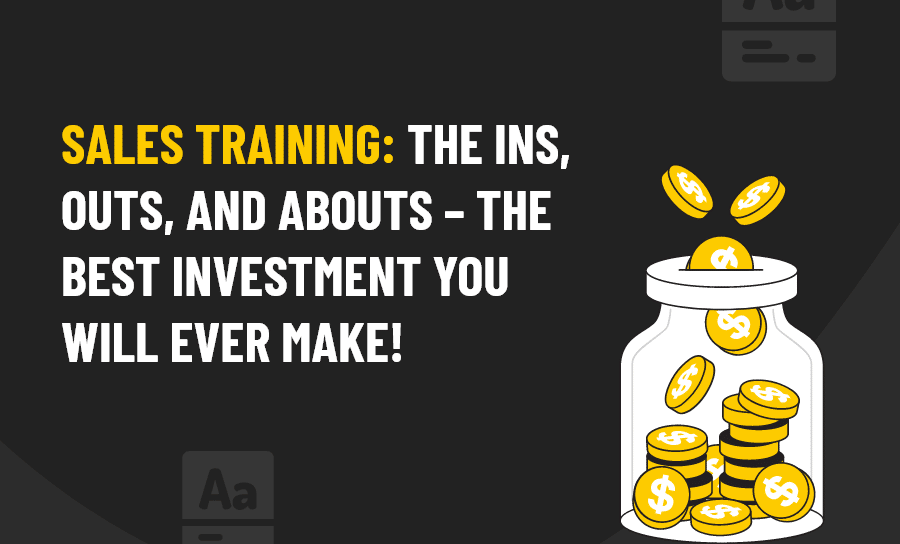Google co-founder Larry Page once said,
“Revenue is the engine that funds all our innovation.”
To create revenue, you need an effective sales team. To achieve that effectiveness – and generate that income – you need to maximize that engine.
Investing in your team will not only benefit your company – it will also boost morale. Showing your sales reps that you consider them a worthwhile investment is guaranteed to improve performance!
FIVE OBSTACLES TO SALES

Photo Credit: www.robberkley.com
In today’s ever-changing market, the stakes have never been higher. Competition is fierce, and brands are continuously evolving to stay relevant and keep their heads above water.
Having a great product is no longer enough to keep you ahead of the competition. You need a winning sales pitch – and a team equipped to deliver that pitch effectively.
This is where sales training comes in. Companies in the US spend $20 billion a year training their sales reps. This 8-figure sum paints a pretty clear picture of just how important sales training has become.
Before we get into the finer details, let’s look at the challenges that make sales training a necessity:
1. Prospecting:

Photo Credit: www.huffingtonpost.ca
It’s often demoralizing- particularly if you’re new to sales when a prospect turns you down. While the salesperson’s confidence can take a beating, and it can also discourage future efforts. Other salespeople become more aggressive, and instead of engaging positively – and patiently – with prospects, they can become borderline stalkers.
Neither of these approaches are going to endear the sales rep to the customer. Nor are they going to help them achieve a sale.
In fact, according to salesessentials.com, over 50% of salespeople give up at 1st contact if they get a ‘NO’ from the prospect.
That’s half of your potential revenue down the drain.
Sales training targets prospecting fatigue and ineffectiveness, and can help your team land that client!
2. Communication:

Photo Credit: www.freepik.com
Merely quoting a price does little to indicate the value of a product.
Offering a quote or proposal to a potential client is a vital part of the sales process. An example of this process can be found on Wikipedia:
“The person calculates an estimated amount, and gives this to the customer, so that they can have an idea how much it will cost. Sales quote is for example a quote given to the customer by an auto insurance broker based on details like income, work position, criminal record and others.”
The fact is that many salespeople find this process tedious – especially if they are skeptical about the client’s interest and suspect they are wasting their time.
If the proposal or quote is given from this attitude, it will often fail to impress. Pricing is competitive, and if a customer looks elsewhere, it’s safe to say they can find a product similar to yours for the same rate – or even cheaper.
A winning proposal will tell the potential client why they should choose your product, instead of your competitor’s. While using tools like digital sales rooms can accelerate the sales cycle by centralizing essential resources, tools, and information in one platform. Anchor text: digital sales rooms.
How does one go about this?
Two words: sales training.
3. Listening:

Photo Credit: www.searchenginejournal.com
According to American financier Bernard Baruch,
“Most of the successful people I’ve known are the ones who do more listening than talking.”
Many of us are guilty of ‘listening to reply’. We wait for others to finish talking, and spend most of that time plotting our response. This is particularly true of some salespeople. There is a tendency to focus on the questions they should be asking (numbers, price ranges, non-negotiables etc.), rather than on how well they listen.
Listening and hearing are not one and the same. A good listener exercises patience and makes a concentrated effort to understand the other person’s point of view.
After all, how can you sell somebody something when you don’t know what they want – or why they want it?
They may not know themselves. However, a good salesperson can use listening skills to help the client ascertain this.
In such cases, sales training acts as a safety net, as it teaches you how to hone this vital skill!
4. Closing the Sale:

Photo Credit: pinterest.com
It’s the epitome of frustration: you’ve been wooing a prospective client for days now. You’ve worked tirelessly to convince them why your product or service is the number one option.
Then, at the last minute, the client pulls out.
Why is this?
Sometimes it’s cold feet. Often, however, it’s the salesperson missing the signals.
A client could send hints they are ready to move forward with questions like ‘So what’s next?’, ‘How can we start?’ etc. The salesperson, however, gets carried away and continues listing the many benefits and extra features the buyer can choose from. This overzealousness can often dissuade a potential client.
In order to avoid this pitfall and close that deal, your team needs proper guidance. Sales training will provide this and more!
5. Sales Skills:

A key skill that every good salesperson should master is the art of negotiation.
Remember bartering on the school playground with football cards and candy? We all use negotiating in our everyday lives.
However, this vital skill comes easier to some than others. Not everyone sees it as a useful tool. In fact, some people actively shy away from the potential discomfort that negotiating can lead to – especially since money is involved.
Of course, not every sale requires negotiation. Most do, however – particularly when it comes to business-2-business deals. The ability to be flexible and reach a compromise that satisfies all parties is crucial to success.
Sales training will coach your team on how to negotiate results that will benefit your company!
Now that we’ve established why sales training is needed to revolutionize your business, let’s take a look at how it goes about this.
HOW SALES TRAINING WORKS
1. The definition
Here’s how Training Industry defines it:
“Sales training involves the personal development of skills and techniques related to creating and exploring new sales opportunities, as well as closing sales for an organization.”
Sales training is usually delivered through a mixture of seminars, workshops and practical implementation. Some programs are exclusively digital, while others offer face-to-face input. Whatever method it uses, it needs to be targeted to your company’s field, and it needs to be actionable.
2. The target audience
This training will obviously be for those who work in sales: representatives, managers, channel professionals, product professionals and sales force automation experts, to list a few.
Basically, anybody directly – or indirectly – involved with driving revenue in your company can benefit from sales training.
3. The content
There will be some variation in the exact format of each package. However, in general, following topics should come up in some form or another:
- Client relationship management
- Improved understanding of customers’ needs
- Enhancing communication with clients
- Providing effective feedback to clients
- Improving client interactions
This list is far from comprehensive. A solid training package should tackle the challenges unique to your company. For example, a training package that only touches briefly on digital marketing isn’t going to work if that’s the main focus of your company.
Effective sales training needs to cater to your specific industry.
WHAT SALES TRAINING CAN DO FOR YOU
According to a study by CSO Insights , companies who invested in top-ranked sales training programs reported 10% higher win rates.
Successful training in this field can yield a wealth of results – some tangible (profit margins), and some less obvious at first.
Here are 12 areas of your business that sales training can dramatically improve:
1. Productivity
One of the benefits of sales training is an increase in productivity.
It’s fair to argue that this is more of a natural byproduct than a specific goal. Your sales reps will have learned how to court a prospective client, how to understand and communicate with customers, and how to close a sale effectively.
Implementing these skills will boost productivity organically as your team gains confidence and sees positive results. Improved results equal improved morale. The higher the enthusiasm, the more likely sales reps are to kick that revenue engine into full gear.
Not only will an increase in productivity improve staff motivation – but also enhance your profit margin. When business is good – consistently good – this translates into bonuses and additional benefits. Being able to offer top-quality incentives will motivate your team, who will, in turn, go to bat for your business.
It’s a win-win situation.
2. Income

Photo Credit: www.vecteezy.com
This one overlaps with the previous point. Nevertheless, it’s a big one.
Everybody within a company benefits when revenue increases. Or at least, they should. Whether you operate on a commission basis, bonus scheme or performance-based raises, one thing’s for certain:
You need to keep the money flowing.
Understanding that sales training will directly improve revenue will help your team cooperate. They’ll be a lot more likely to engage with the program and any extra effort it requires once they realize what’s in it for them. That might sound cynical, but that’s the reality.
After all, isn’t that the reason you are investing in the training – to increase your company’s income? Sure, you want to grow the business, develop new strategies and beat the competition.
All these things, at the end of the day, are means to an end. And that end is profit – the thing that enables you to keep your business going.
3. Confidence

Photo Credit: www.vecteezy.com
A lot of these pointers go hand in hand. However, focusing on how each one results from sales training will help sell you on its benefits.
Much of sales is commissions-based. While this system generally incentivizes top performers, it can totally demoralize others. Sales is a tough field. Repeated rejections, coupled with the loss of income, can be enough to cripple an otherwise valuable rep who may just need a bit of solid guidance to achieve success.
Rejection is always going to be a part of sales. Learning how to keep it from affecting your performance is a key skill covered in sales training. It will provide your team with the tools they need to have confidence in their abilities.
Knowing that they put their best foot forward and delivered a winning pitch will help sales reps not to take rejection personally. In fact, sales training will help them develop thicker skins, and teach them how to turn rejection into opportunities for growth.
4. Sales Fundamentals

Of course, confidence isn’t enough on its own. In fact, an inflated sense of one’s own abilities is often one of the biggest obstacles to personal and professional development.
Having confidence may keep you on the hunt, but it isn’t going to help you catch your prey. Sales reps need to have a demonstrable understanding of the following basics:
- Identifying prospective clients
- Determining when to pursue a sales opportunity further
- Company sales processes
- How to formulate a winning proposal
- Tailoring a sales pitch to an individual client
The above list may seem like an obvious inventory of a sales skill set. However, you’d be surprised at just how little understanding there is among some salespeople – especially new ones – about these essential basics.
Match comprehensive knowledge around these topics with an increase in confidence, and you’ll have a truly talented crew!
5. Sales Rep Retention

Photo Credit: www.freepik.com
Sales training and its positive effect on your company’s revenue will definitely help in this regard. Besides, it will help you keep your already-seasoned team members happy.
Think about it. You’ve invested in the hiring process – job ads, recruitment agencies, admin etc. That’s not even counting all the capital you’ll have put into any further training – such as internal/external courses, seminars or company-funded qualifications.
Many companies are willing to fork out the big bucks to secure a top-performing employee. However, this sometimes comes at the price of keeping current workers satisfied.
This is a big mistake.
Investing in quality sales training tells your staff that their career progress matters. It sends a message that you consider them a worthwhile investment, and you value their contribution to the company.
And once they start seeing – and benefiting from that training, your sales reps will be more motivated than ever! They’ll also stick around once it’s clear that the company they work for is just as invested in their success as they are.
6. Momentum

Photo credit: www.freepik.com
We all know about ‘peak’, i.e. that time of year where interest in your product and services soars over a period of time.
It’s great. However, it’s also seasonal. You need your team to keep that momentum going all year round if you want to generate a consistent profit.
A lull in sales is the perfect time to introduce a sales training program. Not only will your team not need any convincing that things need improving (a slump tends to have that effect), they will also be eager for a change of routine.
Sales training is a sure-fire way to beat those seasonal blues. It will also help you and your team break free from any ruts or negative work habits – the kind that often creep up on us without our knowledge.
Nobody enjoys a losing streak. Think of your sales trainer as a brand new sports coach. Their job is not only to train your team, but also to inspire them and keep the energy flowing.
7. Attracting the best

Photo Credit: www.istockphoto.com
The fact that you invest in sales training shows you take your company and employees seriously. We’ve already discussed how this positively impacts your team members and inspires loyalty.
An additional benefit to sales training is that it will attract high-quality sales reps. Think about it: if you knew a company provided top-of-the-line training that gave their employees an edge, wouldn’t that interest you? After all, you want a job with tangible opportunities for career growth – especially if you are already on a roll.
If a sales rep has an outstanding performance history, chances are that other companies are headhunting them. If you want to land them, you’ll need to show them why your company is the number one option.
Investing in top-quality sales training will attract top-quality salespeople – which, in turn, will drive up those revenue numbers.
8. Product Knowledge

Photo Credit: www.freepik.com
Sales training will teach you and your staff how to market your product to a wide range of audiences. Doing this requires an in-depth understanding of the product itself.
We’re all familiar with the quote about not ‘seeing the forest for the trees’. Being in constant proximity to your product or services can sometimes blind you to its potential.
A good sales trainer will help you examine your product through a unique lens. They’ll teach your team which specific features attract specific demographics, and how to market it to them.
9. Client Base

Photo Credit: www.entrepeneur.com
This ties in with the previous point. Knowing how your product works and how it can work differently for different audiences will help you cast a wider net.
Sales training is all about improving revenue for your company – not just temporarily, either. In fact, company growth is contingent on the ability to attract new buyers, and much of that involves targeting a new customer demographic.
10. Current Clients
We’ve mentioned how sales training is paramount when it comes to keeping your current sales team satisfied. The same applies to your existing client base.
Suppose you market products manufactured by other companies. An increase in sales is guaranteed to please. A steadily-rising profit line will appease even the most prickly of customers.
If the sales training results in a revamp in your services or product, you can offer this new-and-improved feature to your loyal customers. They may have been on the hunt for a specific aspect of the product that wasn’t available or streamlined before.
In addition, long-term customers will see a marked improvement in their engagement with your sales team. The skills they’ve honed, such as improved communication and much more, will not go unnoticed.
Sales training creates a knock-on effect that will send positive ripples through your entire network!
11. Closing Ratio
One of the skills your team will learn is how to close a sale successfully.
The benefits of this one are pretty obvious, so we won’t go too much into detail.
It’s sufficient to say that closing sales is one of the most impactful outcomes of investing in training. It boosts income and morale, and creates revenue you can then use to upscale your business.
The customer, your team, and you: everyone’s a winner in this scenario!
12. Prospect Experience

Photo Credit: www.irespectonline.com
The final point is one of the most important – and sometimes overlooked – factors in a sale: prospect experience.
Many customers will shop around before deciding on a product. While prices and products are competitive, often the deciding factor can be their experience with the sales rep.
A negative first impression, for whatever reason, is a mark against your product and increases the chance a prospect will take their money elsewhere. Sales training and the skills it instils will ensure your team makes an excellent first impression. And if a customer walks away with a positive experience, they are very likely to return – whether then or in the future!
We’ve gone over the pervasive benefits of sales training. Now, let’s talk about how to choose the right trainer for your company.
FINDING THE RIGHT SALES TRAINER FOR YOU
We’ve established what a sales trainer is, and the benefits of hiring one. But how can you be sure you’ve picked the best fit for your company?
Here are our top 6 things to look for:
1. Experience
Experience in sales is a no-brainer when looking for a top sales trainer. Instead, ask yourself if their experience is relevant to your specific company.
Use these questions to help:
- What kind of sales do you need their help with? Business to Business or Business to Customer?
- What medium are you using for your sales, and do they have experience in that regard?
- Have they worked in multi and omnichannel sales?
- Are they up to date with digital marketing trends?
Another thing to consider is whether the trainer has worked with companies operating on a similar business model and structure as yours.
Some sales training companies provide standard training based on a multi-step system. Others use a series of mnemonics to teach a sales process.
Weigh their work background and success stories against the specific kind of growth you are looking for.
2. Online Presence

Photo Credit: www.vecteezy.com
In this digital era, where marketing has evolved, a competent trainer will evolve with it.
Any potential candidates should have a robust online presence. This should be easily accessible through a wide range of media (websites, blogs, audio/visual content, social media etc).
Get a feel for the sales trainer’s personal approach by checking out their virtual content.
If they sell themselves convincingly and across a broad media range, they can teach your team to do the same!
3. Evidence of success

Photo Credit: www.freepik.com
Good reviews are gold dust. A glowing testimonial carries a lot of weight and is a huge factor for potential customers when considering a product.
When selecting a trainer, ask for evidence of client success stories.
You’ll want examples specific to your industry or company size as much as possible. In fact, take it a step further if you want.
Get in touch directly with the business so they can relate their experience personally!
4. A robust curriculum

Photo Credit: www.vecteezy.com
Anyone can stand in a conference room, give a presentation, and go home. You’ll want a dynamic program, delivered through a wide range of media (such as video conferences, in-office sessions, live tasks etc), that engages your team and encourages out of the box thinking.
It should be tailored to your company’s specific needs and address its challenges.
When considering a trainer, check that their program includes the following:
- Evaluation
- Impact Training
- Reinforcement
- Accountability.
A good training program should be a gift that keeps on giving. This applies not only to ROI in terms of sales, but in follow-up as well.
Does the trainer offer feedback sessions where they touch base with you about your progress?
Does guidance in some form continue after the initial training is completed?
Make sure there is ongoing support on offer to keep the training fresh and relevant!
5. Sales history

Photo Credit: www.vectorstock.com
We’ve touched on the importance of a sales trainer’s experience in coaching clients like your company. Another vital point to examine is the job history of the trainers themselves.
Do they come from a sales background?
What companies have they worked for, and for how long?
How broad is their area of personal expertise in terms of sales techniques? Can they give some concrete examples?
Ask them for details, especially about grass-roots experiences with methods your team are currently using. If the sales trainer has ‘walked the walk’, this will give them the credibility they need to motivate your staff. Which brings us to our final point:
6. The ‘acid test’

Photo Credit: www.istockphoto.com
This one could technically be listed under ‘sales history’, but its importance in building rapport among salespeople has earned it its own spot.
A true test of a salesperson’s grit, skills and ability is summed up in two words: Cold calling.
Although some may be drafting an obituary for this old-school marketing tactic, cold calling remains a tried-and-proven sales method…if it’s done correctly!
A great sales trainer is, firstly, a great salesperson – meaning they will have tackled even the most challenging tasks. Look for proven experience with cold calling and any notable results.
MEASURING SUCCESS

Photo Credit: www.freepik.com
An effective sales training program is a significant investment – both financially and timewise. Like any investment, you want to be sure it pays off, and you want those results to be as tangible as possible.
Recent studies show that sales training results in significant R.O.I (Return On Investment). Business consulting firm Accenture says a company gets a return of $4.50 for every dollar invested in training. In the U.S., more than $5 billion is invested in sales training and improvement.
Talentlms.com discusses how to measure training ROI . It suggests a combination of an increase in skills, more significant annual revenue, or even the number of employees trained.
Did we confuse you there? Let’s break it down.
Here are 5 ways to measure your training ROI.
1. Employee engagement
When measuring engagement, you should examine the following:
- How much your employees actively participated in the training activities
- Their levels of interaction with the course content
One way to do this is obviously through numbers. Assess how many employees completed the training. Are there any recorded activities, whether written or filmed, that you can view? If there were optional workshops or live events, how many took part?
2. Employee Feedback
According to a study by management firm McKinsey, only 50 % of companies actively engage with employee feedback from training programs.
This might seem unbelievable. After all, sales training doesn’t come cheap (not if it’s top-notch, at any rate). It makes sense you’d want to know exactly how it went down with its target audience – a.k.a your team.
Surveys are a highly-effective way to measure the effectiveness of the training. You’ll want to ask your sales team questions such as:
- Did they enjoy the experience?
- Do they feel they’ve gained useful knowledge and skills?
- How confident are they with their ability to implement these skills?
- Was the training motivating?
- Would they be happy to do it again?
- Would they recommend it to others?
Another useful tip is to use a survey with a Likert scale system. This can help translate your team’s answers into numerical data, which will show R.O.I results.
3. The KSA
Another vital aspect of training in R.O.I measurement is KSA – Knowledge, Skills and Abilities.
Measuring learning is, fortunately, one of the easiest assessment strategies out there. There’s a wealth of competency and knowledge recall tests out there – and the best part is, they all deal in scores, meaning they can translate into R.O.I. They’re usually automated too, which is not only simpler – it’s also cost-effective!
A great way to make this relevant is by asking employees to undertake a pre-test. They can read through the learning objectives of the program and rate their knowledge of each topic.
Once the training is complete, have your staff fill out the test again. Do they feel that they’ve learned something? KSA testing is an excellent way to measure the impact of any training on your sales team.
4. Real-Life Application
While KSA acquisition is all good and well, what’s equally important is your team’s ability to implement the training at ground-level.
We know that book-learning can go hand-in-hand with experience. That being said, it can’t replace it. Another way to measure training R.O.I is by judging how well that training has been implemented.
Trying to assess this while your team is on the job might not be very practical. Hovering over someone’s shoulder while they try to close a sale, for example, puts them under unnecessary pressure and could cost them, and you a win.
Instead, consider the following options:
- Roleplaying
- Branching scenarios
- On-the-job tasks (assessed discreetly)
- Online simulations
Use the scores from these various practical tests to measure R.O.I on KSA application.
5. Goals Achieved
Whenever a funding request is raised, whoever is pitching it, needs to be able answer this question:
How will this investment benefit the company?
We’ve established that, in order for a training program to be successful, it must be tailored to fit your business. By tackling your company’s unique challenges, the coaching should result in overcoming those obstacles.
Basically, if the sales training was effective, you should be able to see tangible progress in reaching your company goals.
Whether the endgame is to boost sales, generate new leads, or break into a new market, your newly-trained sales team should be killing it. Of course, not all success is instantaneous and measuring this particular R.O.I may take longer than expected.
However, it should still be happening – regardless of the timeline.
The five tools listed above are helpful ways to measure the effectiveness of any sales training your company may undertake. And if you come up with ideas of your own, that’s even better.
A successful investment in training is a massive win for all involved. Employees feel valued, motivated and challenged. Employers see an increase in profits, an expanded customer base, and a more effective sales team. Even the customer benefits by receiving a higher quality of service.
If there was any doubt in your mind that sales training is a substantial investment, this section should have put that doubt to rest. Done correctly, the R.O.I yielded from expert training programs (tailored to suit your needs) will be easily measured. And, might I add, you’ll need a pretty sizable measuring tape.
GET STARTED NOW!
Salespeople are a direct representation of your company. A well-trained team is a winning team – and surely you want your team to win. Not only that, but you also want them to smash the previous record holder’s figures off the chart for good.
How do we do this?
By now, you know the answer to that question. Hiring a good sales trainer will equip your team to do this, and help give your company the edge over the competition.
So what’s next, you ask?
Pearl Lemon Sales Training is here to do the heavy lifting for you!

Photo Credit: www.pearllemongroup.com
Pearl Lemon is an award-winning digital marketing agency. We not only talk the talk – our sales training experts are seasoned reps who’ve put in the time and have the experience to back it up!
How? We’d be delighted to show you. Our sales strategies took a business from 0 to 100K in just six months. Not only that, but our training packages will deliver a sales boost of 200% (at least)!
The best part is: we want to share our secrets – with YOU.
Here are four tough aspects of sales we can help with:
(sourced from Pearl Lemon Sales)
1. Prospecting

Photo Credit: www.pearllemonsales.com
Salespeople cite prospecting as the most difficult aspect of the sales process, and they struggle with it even over closing. Let Pearl Lemon Sales pros show you how to make use of new ways to develop prospects.
Mastering this crucial part of the sales process will lead to increased revenue and stellar sales.
2. Cold Emailing for Sales Success

Photo Credit: www.pearllemonsales.com
Cold email isn’t dead. Cold email remains a hugely effective sales strategy, but only in the right hands. Let a team that bootstrapped a company from 0 to 100K in less than 12 months via cold email show you how to use cold email to boost your business and your bottom line.
3. Cold Calling For Sales Success

Photo Credit: www.pearllemonsales.com
No matter what other sales initiatives are in place, or what else is going on in the business, a skilled salesperson who has mastered the art of cold calling can always pick up a phone and make a sale.
But cold calling isn’t easy. How do you get past the gatekeeper screening the calls – then get the prospect interested in just a few minutes? Pearl Lemon Sales skilled trainers will share their secrets!
We’ll show you how to breeze past call screeners, and get your sales pitch across to decision-makers successfully.
4. Overcoming Objections for Sales Success

Photo Credit: www.pearllemonsales.com
Most sales objections are inaccurate or based on fear, distrust or lack of product education. When salespeople try answering the most common prospect objections, they often focus on the wrong thing.
Rather than struggling to overcome objections, what if there was a way for the prospect not to have them in the first place? Let Pearl Lemon Sales expert trainers show you how it’s done – then teach you how to do it yourself.
When it comes to investing in your company, you want maximum returns. At Pearl Lemon, we believe that anyone can sell anything to anyone – they just need the right tools for the job.
Our sales training package will guarantee you access to elite marketing strategies that will cause your sales to skyrocket!
Ready for lift-off? Head over to Pearl Lemon now and watch your sales hit the stratosphere today!






